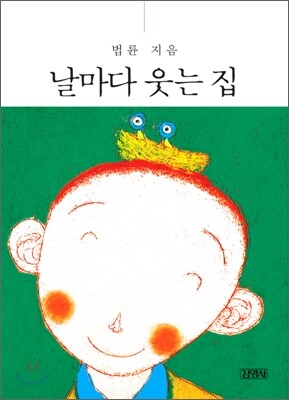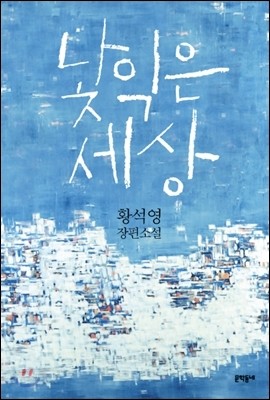Hwang Sok-yong (born 1943) is a South Korean novelist.
Life
Hwang Sok-yong was born in 1943 in Changchun, Manchuria. He spent his early childhood in Pyongyang until the outbreak of the Korean War, when his family fled to the South. He made his literary debut in 1962 with the publication of the short story "Ipseok bugeun" (입석부근 Near the Marking Stone) in the journal Sasanggye. After joining the Korean Marine Corps in 1966, he got shipped off to the Vietnam War. After the war, he became involved in activism against Park Chung-hee’s military regime, working undercover at Guro Industrial Complex, and later fought to expose the truth about the May 18 Gwangju Democratic Uprising, while penning his epic novel, Jang Gilsan (장길산 Jang Gilsan).
Following his visit to North Korea in 1989, he lived in exile in Berlin and New York. Upon returning to Korea in 1993, he was promptly imprisoned and forced to serve a five-year sentence. His novel Sonnim (손님 The Guest) was shortlisted for the prix Femina étranger in France. Hwang was awarded the Emile Guimet Prize for Asian Literature and longlisted for the 2019 Man Booker International Prize for his novel Haejil muryeop (해질 무렵 At Dusk). His novels have been translated and published in many countries across the world including in France, the United States, Germany, Italy and Sweden. He has written Gaekji (객지 Far from Home), Hanssi yeondaegi (한씨 연대기 Mr. Han’s Chronicle), Mugiui geuneul (무기의 그늘 The Shadow of Arms), (오래된 정원 The Old Garden), Sampo ganeun gil (삼포 가는 길 The Road to Sampo), among many others. Hwang’s most recent novel is Cheoldowon samdae (철도원 삼대 Three Generations of Railmen).
Writing
Throughout the 1970s, Hwang Sok-yong published a continuous stream of works that became well known such as "Gaekji," "Hanssi yeondaegi," "The Road to Sampo," and "Dwaeji kkum" (돼지 꿈 A Dream of Good Fortune), becoming a foremost author in the Korean literary world. For the duration of the seventies, he went undercover working at the Guro Industrial Complex and took part in the resistance movement through his membership in the Association of Writers for Actualized Freedom while penning his epic novel, Jang Gilsan.
In the 1980s, Hwang completed The Shadow of Arms, which uses the back-alley black markets of the Vietnam War as its stage, a market that turns into a setting more fitting than any jungle to discover and explore the core of the war. In this novel, we see the perspective of the US government and soldiers, the Vietnamese National Liberation Front, the South Vietnamese under American rule, and the “psychological refugees” who refuse to intervene and become a part of the war, searching endlessly for an escape route instead. Lastly, we have the perspective that overlaps with that of the author: the dazed ROK soldier who has somehow become involved in this foul war.[1]
After being released from his imprisonment in 1998, Hwang penned The Old Garden. With this novel, he cast aside the realism of the past. Instead, a man and a woman in love each declare their own innermost thoughts and feelings, and the time that passes is recorded in a confessional style. This work boasts a form that encompasses every perspective: each character’s own writing and thoughts make up the first person perspective; the words and actions of others within their individual realities constitute the second person perspective; and lastly, the reader who studies each of these characters and their individual worlds provides the third person perspective. In this way, the love story of The Old Garden is perfected through the act of reading it.[1]
The Guest, the final volume in what Hwang calls his twentieth-century trilogy, was born out of the author's reflections that history and our individual dreamlike day-to-day existence are joined. The novel is essentially a round of shamanistic exorcism designed to relieve the agony of the survivors and appease the angry spirits who died during the fifty-day massacre that occurred in Sin-cheon, Hwanghae Province, during the Korean War. The work is modeled after the “Chinogwi Exorcism” of Hwanghae Province, which is made up of twelve separate rounds, reflected in the twelve chapters of the novel. As is the case with an actual exorcism, the dead and the living simultaneously cross and re-cross the boundaries between past and present, appearing at what seems like random intervals to share each of their stories and memories.[1]
References
[1] Hwang, Sok-yong. "On My Twentieth-Century Trilogy." Korean Literature Now, Vol.31 Spring 2016. https://kln.or.kr/lines/essaysView.do?bbsIdx=705
Hwang Sok-yong wurde am 4. Januar 1943 in Xinjing (heute Changchun), der Hauptstadt Mandschukuos geboren.[1] Schon als Schüler schrieb er erste Erzählungen. Hwang Sok-yong engagierte sich den 1970er und 80er Jahren aktiv in der Demokratiebewegung und im Kampf für die Rechte der Arbeiter und erlebte 1980 am eigenen Leib die brutale Gewalt der Militärs beim Gwangju-Aufstand. In dieser Zeit entstanden seine Romane Der fremde Ort (1976), Die Geschichte des Herrn Han (1972) und Der Weg nach Sampo (2000), die sich besonders mit der Frage der Arbeiterbewegung, aber auch der Teilung des Landes beschäftigten. 1985 formuliert er ein Manifest der Demokratiebewegung und veröffentlichte seinen Roman Die Schatten der Waffen, der sich kritisch mit dem koreanischen Engagement im Vietnamkrieg auseinandersetzt. Nach seiner Teilnahme an einem Schriftstellertreffen in Nordkorea lebte Hwang von 1989 an vorübergehend in Berlin und New York, bis er 1993 nach Seoul zurückkehrte, wo er wegen seiner Besuche in Nordkorea zu sieben Jahren Haft verurteilt wurde. Nach fünf Jahren Gefängnis wurde er 1998 von dem neugewählten Präsidenten Kim Dae-jung begnadigt und zum südkoreanischen Kulturbotschafter in Nordkorea ernannt. Nach seiner Freilassung publizierte er die Romane Der ferne Garten (2000) und Der Gast (2001), der die historischen Wurzeln des Krieges und der koreanischen Krise reflektiert, die er als einen Zustand der Heimatlosigkeit beschrieben hat.
Las obras narrativas de Hwang Sok-yong forman parte de la genealogía principal de la novela realista coreana a partir de la independencia de Corea (1945). La tierra forastera (1971), es un relato que describió, con acceso directo a la zona en obra, el proceso de litigio obrero de trabajadores en las zonas en construcción bajo la dictadura militar, en la que aún era ilegal la organización del sindicato obrero.5 Una crónica del señor Han (1972) es un relato escrito en base a experiencias autobiográficas que la familia del escritor atravesó después de llegar al sur de Corea pasando la frontera nacional tras la independencia de Corea. Esta obra narrativa describe de manera real el modo en que el protagonista, que había llegado al sur de Corea eludiendo el conflicto ideológico durante la guerra de Corea, se convirtió en victima de nuevo, como objeto de la ideología y del poder, en una situación histórica en que se construía un régimen violento de anticomunismo.6 La novela larga El huésped (2001), la primera obra de ‘Tres series del Este Asiático’que Hwang Sok-yong proyecta, trata la tragedia de la guerra coreana, cuya consecuencia fue una lucha fratricida. Hwang Sok-yong es un escritor realista, representativo de Corea del Sur, y también, escritor comprometido, al mismo tiempo que ha cambiado ininterrupidamente la meta y el método que perseguía el realismo sin detenerse en una corriente literaria.
De 1966 à 1969, il s'engagea au sein de l'armée coréenne pendant la guerre du Vietnam, se battant alors à contre-cœur aux côtés des forces américaines, les considérant comme des pourfendeurs de la liberté. Au Vietnam, il fut notamment responsable du "nettoyage", de l'effacement des preuves de massacres de civils. Une terrible expérience au cours de laquelle il fut constamment entouré de cadavres en décomposition et le témoin direct des pires massacres. Sur la base de ces expériences, il composa la nouvelle La pagode (Tap)en 1970, ce qui lui permit de remporter le prix littéraire du journal Chosun Ilbo et l'embarqua dans une riche carrière littéraire. En 1985, le roman Journal de Kwangju : Au-delà de la mort, au-delà de la période sombre, (Gwangju ilgi : jugeumeul neomeo, sidae-ui eodumeul neomeo) écrit initialement par un journaliste de quotidien local Lee Jae-ui apporta une nouvelle période trouble dans la vie de Hwang. Celui-ci accepta en effet d'apposer son nom sur l'œuvre en tant qu'auteur afin d'aider le roman à mieux se diffuser. Cela vaudra à Hwang ainsi qu'à l'éditeur d'être de nouveau emprisonné. L'ombre des armes (Mugi-ui geuneul), récit basé sur son expérience au Vietnam fut publiée en 1985. Ce récit a été traduit en français en 2003. En 1989, Hwang se rend à Pyongyang en Corée du Nord en passant par Tokyo et Beijing, en tant que représentant du mouvement démocratique naissant en Corée du Sud.
1943年、当時の満州の首都新京(現長春)に生まれる。本家は現在の北朝鮮に位置する黄海道信川。満州国の消滅に伴い家族と共に母方の実家である平壌に移るが、1947年にはソウル外縁の永登浦に定住。1950年に勃発した朝鮮戦争でまた引っ越しを余儀なくされるが、その後景福中学・高校に通い、1962年に高校を中退する。同年、雑誌『思想界』新人文学賞に『입석부근(立石附近)』が入選し、文壇に現れることとなった。1971年『객지(客地)」(邦訳:1986年、岩波書店)で高い評価を得ると、1974年-1984年にかけて長編大河小説『장길산(張吉山)』を手がけ、1983年-1987年『무기의 그늘(武器の影)』(邦訳:1989年、岩波書店)などでリアリズムを追求した作品を発表し続けた。2000年には『오래된 정원(懐かしの庭)』を発表(邦訳:2002年、岩波書店)し2007年には映画化もされた。同じ2007年には移民、難民の視点から現代世界の哀切を描いた『바리데기(パリデギ)』を発表(邦訳:2008年、岩波書店)し、韓国国内でベストセラーとなる。
黄皙暎,韩国最有成就的作家之一。他于2012年,正逢步入文坛50周年及古来稀之际发表了这部长篇小说——《湍流声》。他的文学生涯大致分为前、后两期。前半期主要撰写了《客地》、《韩氏年代记》、《去森浦的路》等中短篇小说及《张吉山》、《武器的阴影》等长篇小说。后半期则经历了一段空白期——从1987年到1998年期间,因访问北朝鲜、流亡和入狱而辍笔不耕后,开始发表《古老的庭院》、《客人》、《钵里公主》等作品到现在为止。他所有的作品几乎都介绍到欧洲,并翻译成外文,尤其是《韩氏年代记》在德国受到了好评。而且,描述沦为资本主义列强角逐场的越南战争小说——《武器的阴影》也被日本评论家交口称赞。这部作品以作家早期发表的长篇小说——《张吉山》中的“民众共同体”为基础,加上作家本人对故事的发生及存在理由的反思,可以说是一部彰显“老将风范”的作品。
황석영(1943~ )은 대한민국의 소설가다.
생애
황석영은 1943년 중국 장춘에서 태어나 해방 후 귀국하였다. 여러 군데 이사를 다니며 불안정한 성장기를 보냈지만, 어렸을 때부터 책을 많이 읽었고 글솜씨가 뛰어났다. 고등학생 때 단편소설 <입석부근>(1962)을 발표하며 데뷔했다. 1964년 한일회담 반대시위를 하다가 경찰서에서 만난 한 노동자를 따라 신탄진 공사판과 여러 간척지 공사장을 돌아다녔다. 이 시절의 경험은 훗날 <객지>(1971), <삼포가는 길>(1973) 등 노동 쟁의를 다룬 초기 소설에 담겼다.
1966년 해병대에 입대했고, 이듬해 베트남전에 참전했다. 베트남에서 황석영은 노동자의 밑바닥 삶과는 또 다른 역사의 현장을 목격했다. 1970년 제대 후 미국의 제국주의를 고발하는 작품 단편〈탑〉으로 다시 데뷔하며 본격적인 작품 활동을 시작했다. 1970년대 후반에는 《장길산》 집필을 위해 이주한 전라남도 지역에서 농민 운동에 참여했다. 이러한 민중문화운동의 연장선상에서 1980년 광주 민주화운동에 적극 참여했다. 1985년 광주항쟁의 기록을 담은 산문집 《죽음을 넘어, 시대의 어둠을 넘어》를 출간했다.
1989년에는 한국민족예술인총연합 대변인 자격으로 북한을 방문한 이후 반체제 인사로 분류되어 한동안 귀국하지 못하고 독일, 미국 등을 떠돌며 망명 생활을 했다. 1993년 귀국하여 국가보안법 위반으로 7년 형을 선고받고 5년간 복역하다가 1998년 대통령 특별사면으로 풀려났다. 출감 이후 《오래된 정원》(2000), 《심청, 연꽃의 길》(2007), 《철도원 삼대》(2020) 등을 발표하며 왕성한 작품 활동을 이어나갔다.
작품 세계
황석영은 민중의 시각으로 현실을 바라보고 형상화한 한국의 대표적인 리얼리즘 작가 중 한 사람이다. 그의 작품은 초기작 <한씨 연대기>(1972)부터 후기작 《바리데기》(2007)에 이르기까지 10여 편 이상이 중등 교과서에 수록되어 있으며, <삼포 가는 길>(1973)은 대학 입시에 출제된 바 있다. 황석영의 작품들은 해외에서도 관심을 끌어 프랑스, 미국, 독일, 이탈리아, 일본, 스웨덴 등 여러 나라 언어로 번역, 출간되었다.
황석영의 문학은 1970-1980년대의 작품과 2000년대 이후의 작품으로 분류할 수 있다. 그의 초기 문학은 주로 단편소설을 중심으로 전개되었으며, 크게 다섯 가지 유형으로 구분할 수 있다. 첫째, 전쟁에 의한 인간성 상실 및 삶의 황폐화를 다룬 작품, 둘째, 파업과 투쟁을 묘사하며 적극적으로 노동 현실을 비판한 작품, 셋째, 산업화와 농촌의 해체를 그린 작품, 넷째, 소시민적 인물을 등장시켜 근대화의 과정에서 겪는 내적 갈등을 그린 작품, 다섯째, 청소년 시절에 겪는 고민과 성장의 과정을 그린 작품이다.
황석영은 방북 사건으로 1990년대 대부분을 망명과 수감 생활로 보낸 뒤, 2000년대부터 작품 활동을 재개했다. 장편소설을 중심으로 전개된 2000년대 이후 황석영 소설의 소재와 공간은 한반도의 경계를 넘어 동아시아와 세계 전체로 확대되며, 아시아적 서사 형식에 대한 탐구를 바탕에 깔고 있다. 특히 2020년에 발표된 《철도원 삼대》는 일제 강점기에서 해방을 거쳐 21세기로 이어지는 노동자와 민중의 삶을 실감나게 재현하면서 한반도의 근대사를 세계사의 흐름과 연결하여 그려 냈다는 평가를 받는다.
주요 작품
1) 소설집
《객지》, 창비, 1974.
《북망, 멀고도 고적한 곳》, 동서문화원, 1975.
《삼포 가는 길》, 삼중당, 1975.
《장사의 꿈》, 범우사, 1977.
《가객》, 백제, 1978.
《돼지꿈》, 민음사, 1980.
《장산곶매》, 심설당, 1980. (희곡집)
《골짜기》, 인동, 1987.
《아우를 위하여》, 심지, 1987.
《열애》, 나남, 1989.
2) 장편소설
《심판의 집》, 열화당, 1977.
《장길산 1~10》, 현암사, 1984(재간본 : 《장길산 1~12》, 창비, 2020.)
《무기의 그늘》, 형성사, 1988(재간본 :《무기의 그늘》, 창비, 2006.)
《오래된 정원》, 창비, 2000.
《손님》, 창비, 2001.
《심청, 연꽃의 길》, 문학동네, 2003.
《바리데기》, 창비, 2007.
《개밥바라기별》, 문학동네, 2008.
《강남몽》, 창비, 2010.
《해질 무렵》, 문학동네, 2015.
《철도원 삼대》, 창비, 2020.
3) 산문집
《죽음을 넘어, 시대의 어둠을 넘어》, 풀빛, 1985.
《객지에서 고향으로》, 형성사, 1985.
《사람이 살고 있었네》, 시와 사회사, 1993. (공저)
《5.18 그 삶과 죽음의 기록》, 풀빛, 1996.
《가자 북으로 오라 남으로》, 이룸, 2000.
《아들을 위하여 : 황석영 세상살이 이야기》, 이룸, 2000.
《황석영의 맛있는 세상》, 향연, 2007.
《밥도둑》, 교유서가, 2016.
《수인 1~2》, 문학동네, 2017.
4) 전집
《황석영 중단편전집 1~3》, 창비, 2000.
《황석영 중단편전집 1~5》, 문학동네, 2020.
수상 내역
1989 제4회 만해문학상
2000 제14회 단재상
2000 제12회 이산문학상
2001 제9회 대산문학상
2004 제8회 만해대상 문학상
2004 한국문화예술진흥원 올해의 예술상
2008 제3회 마크 오브 리스펙트상
2018 에밀 기메 아시아문학상
2018 제5회 심훈문학대상




